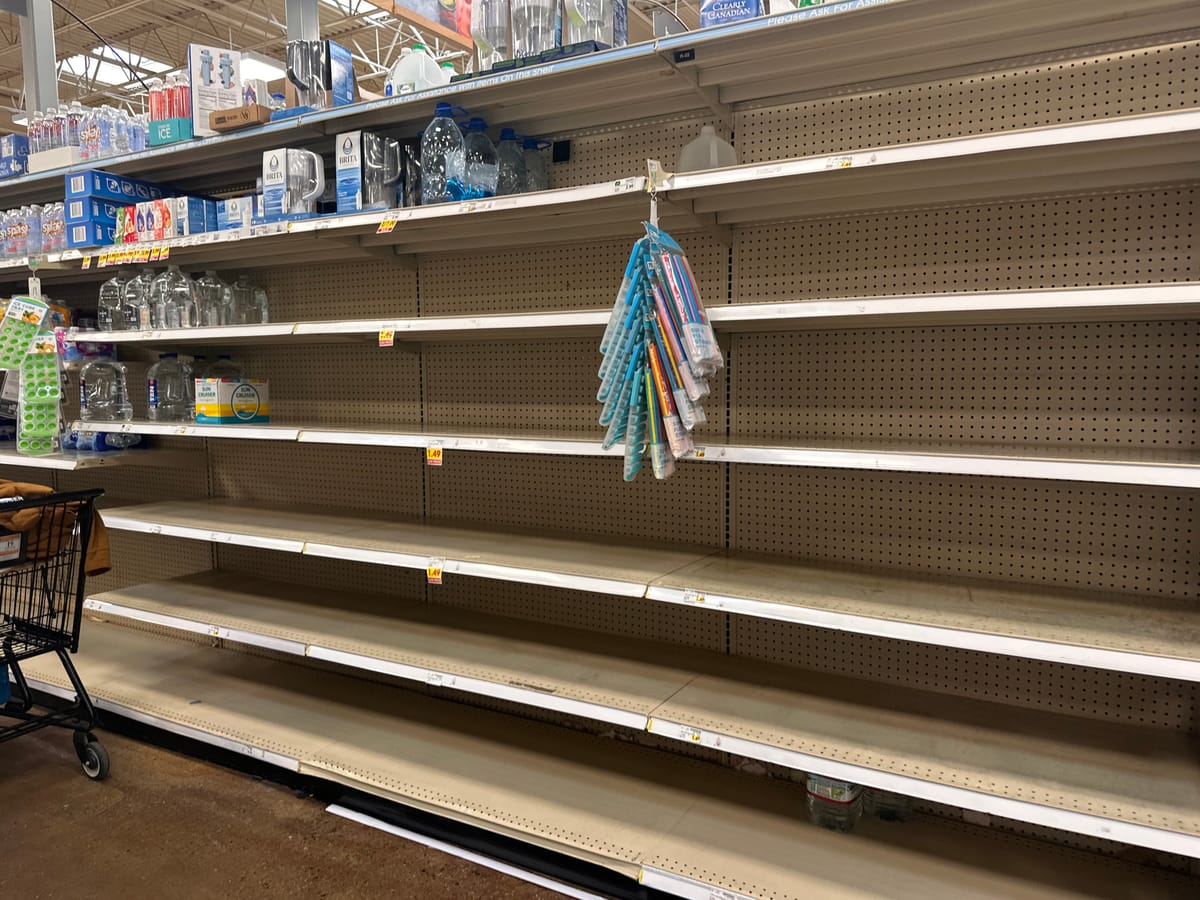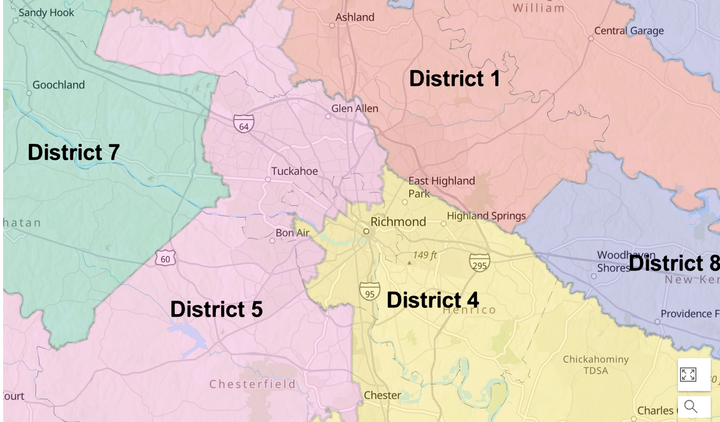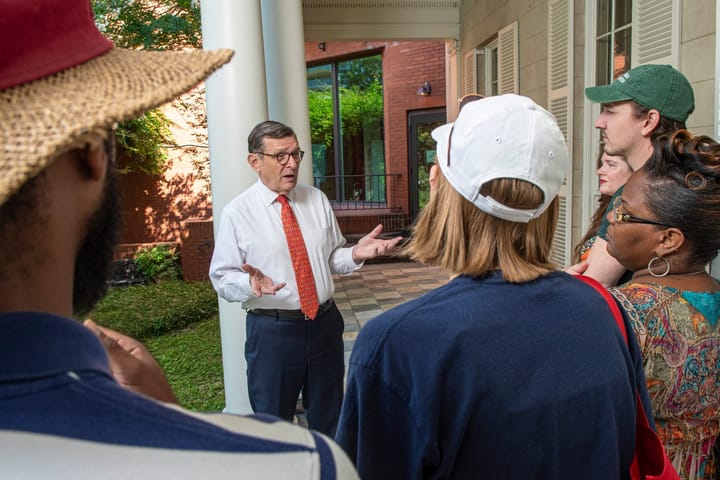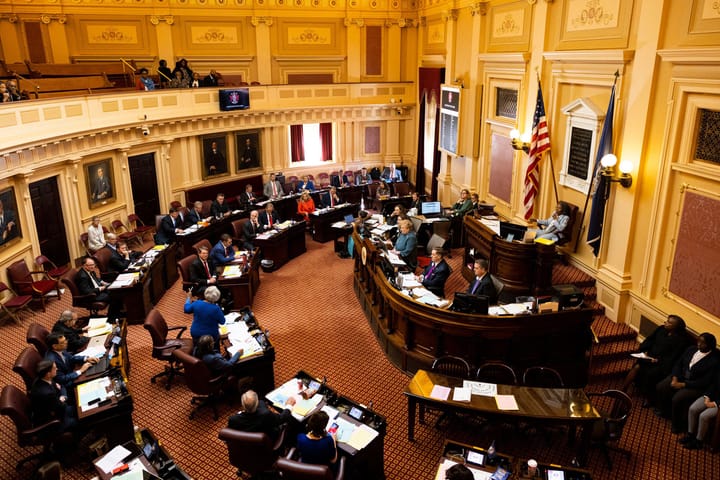‘Here we go again’: Richmond hit with second boil water advisory in five months

For months, Richmond officials have said January's water problem should never happen again. On Tuesday, it happened again.
“Here we go again,” said Melanie Horner, one of several city residents who took to their nearest grocery store on Tuesday morning to stock up on bottled water after learning tap water in some parts of Richmond had been deemed unsafe to drink without boiling it first.
The routine felt all-too-familiar for many city residents and businesses as Richmond officials announced Tuesday that clogged filters at the water treatment plant had led to a loss of pressure.
After residents noticed low water pressure in some areas, the city initially said it had resolved the problem and a boil water advisory wouldn’t be necessary. The city reversed itself in a second news release issued a few hours later, saying the filters had “reclogged” and many of the city’s major neighborhoods would have to boil their tap water before drinking it.
The Carytown shopping district fell squarely into the impacted area, leaving businesses scrambling again to figure out ways to serve customers without being able to rely on city water.
Lily Kirk, a shift supervisor at Kilwin’s chocolate and ice cream shop, said the store had to stop taking milkshake orders because they couldn’t wash their cups. To clean the ice cream scoops, she said, the staff was using water bought from the grocery store.
“Oh my god, not again,” Kirk said as she summarized her reaction to learning about the situation when a co-worker sent a screenshot from a news article.
New York Deli was trying to stay open by closing its bathrooms, serving food in to-go containers and sticking to canned drinks.
“I wasn’t excited about it,” said Allison Good, a manager at the restaurant. “That’s for sure.”
The full impact of the city’s latest water issue wasn’t immediately clear Tuesday. But at first glance, it didn’t appear to be as dire as the original crisis, because it only affects some neighborhoods and has not resulted in a complete loss of running water. Henrico, Chesterfield and Hanover counties have told their residents their water remains safe to drink.
However, major questions remain unanswered, and both Richmond and Henrico said they had activated their emergency operations centers to monitor the situation. Officials said Tuesday they couldn't say for certain how long the boil advisory would last, how much of the city might eventually be impacted and what caused the extra sediment in the water that caused the filters to clog.
Because the city has to go through the same lengthy testing routine as in January to ensure the water is safe, the boil advisory could probably be lifted late Wednesday or Thursday at the earliest. On Tuesday evening, Mayor Danny Avula said the system had stabilized enough that the city had begun the process of taking water samples for safety testing. If all goes well in the multi-step testing process, the mayor said, the boil advisory could be lifted by "mid-Thursday."
The timeline depends on how quickly the city can restore pressure in the system, which can be delayed if too many people use too much water all at once. For that reason, the city asked residents to conserve water by limiting showers, not running dishwashers or washing cars and flushing toilets only when necessary.
The Richmonder is powered by your donations. For just $9.99 a month, you can join the 1,000+ donors who are keeping quality local journalism alive in Richmond.
The city said the area covered by the boil water advisory is served by the same water tank in Ginter Park, which is smaller than other tanks and serves a zone that lost pressure most rapidly. Impacted neighborhoods, according to officials, include Byrd Park, Brookland Park, Carver, Carytown, Chamberlayne, the Fan, Ginter Park, Jackson Ward, Laburnum Park, the Museum District, the North Side, Oregon Hill, Randolph, Scott’s Addition, VCU’s Monroe Park campus and parts of the city center.
By Tuesday evening, the city announced the advisory had widened to include parts of South Richmond, including the neighborhoods of Ancarrow’s Landing, Bellemeade, Blackwell, Commerce Road Industrial Area, Hillside Court, Davee Gardens, Manchester, Oak Grove and Windsor.
Though the causes of the January and May boil advisories were different, the impact was similar for many Richmonders who were again told they could not trust the water they pay the city to provide.
The back-to-back nature of the city’s water problems drew outsized attention to Tuesday’s announcement.
In a post on X, Gov. Glenn Youngkin said state drinking water officials are “actively investigating “the current water quality issue with the City of Richmond.”
“I know this is really challenging for everyone following this winter’s problem,” the governor said.
This week’s episode is a partial repeat of what happened in January, when a power loss caused by a winter storm badly damaged the water treatment plant where the city takes in water from the James River, cleans it and pumps it out to customers.
The January crisis left the entire city without usable water for nearly a week.
Ever since January, city officials have been reassuring residents they learned lessons from the first water crisis and have been working diligently to prevent something similar from happening again.
At a virtual news conference Tuesday, Avula said he understands Richmonders’ frustration, but insisted the water plant and the Department of Public Utilities are heading in the right direction.
“We’ve seen some improvement from January’s event to now in terms of our rapidity in communicating to regional partners and getting information out to the public,” Avula said. “We will continue to invest in our systems, invest in our people to make sure that this doesn’t happen again.”
Avula, who took office in January, said the city is in a “rebuilding mode.”
“We’ve brought new leadership in,” he said. “It’s going to take time for all the systems to be working properly.”
The city’s water plant was recently put under new management. Doug Towne, who was serving as the water plant superintendent for the January crisis, is now on paid leave and longtime DPU employee Ricky Hatfield is now managing the plant on an interim basis.
In an initial news release on the clogging problems Tuesday, Avula said the city’s quick communication showed that new emergency response procedures “worked as planned.”
But the city quickly shifted from that line as it had to tell residents the problem was deeper than the initial news release made it seem.
Explaining why the city initially told residents the impact would be minimal, Avula said officials believed they had restored the system to full capacity by Tuesday morning only to have the clogging problems pop up again.
Avula and DPU Director Scott Morris indicated they couldn’t say for sure what caused the murkier water that apparently caused the clogging.
“In this event, it looks like the raw water quality decreased, which caused the need to have additional backwashing or draining of those filters,” Morris said.
The mayor said he couldn’t say “with confidence” that the boil water advisory will be confined to the area the city identified Tuesday morning.
“It feels good that we’re moving in the right direction,” Avula said. “But until we’ve restored pressure throughout the system, I don’t think I could commit to anything. That’s why we’re watching all these zones so carefully.”
Asked if the city is considering distributing bottled water to the public as it did in January, Avula said officials have discussed ways to provide water to particularly vulnerable residents. But unlike in January, he said, water is still coming out of the tap.
“People can use the water,” he said. “They just need to boil it before they drink it.”
Members of the City Council were still trying to assess the situation on Tuesday and push out updates to their constituents via email newsletters.
Councilor Kenya Gibson (3rd District) said she had asked the Avula administration for information on any plans for “emergency water distribution” to her Northside constituents.
“I have also asked for clarification regarding the conflicting back-to-back news updates,” Gibson said in a written statement. “Please know that I am deeply unsettled by how today’s events have transpired—this is not how we gain the trust of residents.”
The council also struggled with sending conflicting information to residents. Multiple members sent out emails saying the council would discuss the water situation at its regularly scheduled 4 p.m. informal meeting Tuesday afternoon.
Later in the day, the council announced it had actually cancelled its Tuesday meetings and had postponed all its business until next Monday.
“Due to the uncertainty of the status of water services at Richmond City Hall, and out of an abundance of care, caution, and respect for the time, health, comfort, safety, and needs of visitors and staff, Richmond City Council canceled and rescheduled tonight’s Council Informal and Formal Meetings,” Council President Cynthia Newbille said in a statement issued via council staff.
Despite the cancellation of the council’s meetings, City Hall remained open Tuesday.
Eleanor Shaw contributed reporting to this story. Contact Reporter Graham Moomaw at gmoomaw@richmonder.org






